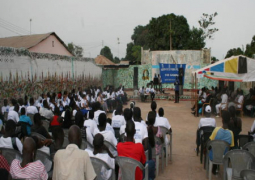
Mrs Jobe-Sanneh made these remarks recently at a one-day NEDI Loan Policy validation exercise held at the NEDI office.
Mrs Jobe-Sanneh, representing the permanent secretary Ministry of Youth and Sports at the validation meeting, added that NEDI aims to improve national economic growth for poverty eradication, as well as support youths and women entrepreneurs/beneficiaries to acquire resources to start self-employment initiatives, and to support and encourage youths and women to take up entrepreneurship for sustainable development.
“The main driving force behind this investment in funding youths and women in entrepreneurship is the result of the need to create jobs for Gambian youths and women, ensure the availability, accessibility and affordability of basic commodities in The Gambia,” she added.
Since the creation of NEDI in 2004, it has spearheaded four phases of disbursement which focused on different types of businesses located in all regions countrywide, she said, adding that the businesses range from consumer shops, tailoring workshops, restaurants, bakery, butchery stalls and fishing boats.
Such businesses were selected due to their link and intended impact on poverty alleviation and as insurance to improve household food security, as well as the promotion of micro, small and medium enterprises, she went on.
The initiative also seeks to drastically reduce the domination of foreigners in our enterprise sector, Mrs Jobe-Sanneh pointed out, adding that the development of the NEDI Loan Policy could not have come at a better time, when NEDI is transforming into a modern public institution.
She was convinced that the policy would go a long way in addressing the existing challenges of the loan application process in NEDI.
Over the past one and half year, NEDI with support from OVP and MoYS has been working tirelessly to improve on its status to effectively respond to the increasing needs of its intended targets, she noted.
The processes led to the enactment of the first-ever NEDI bill, the establishment of the first NEDI board of directors, the conduct of first NEDI audit, the development of NEDI’s institutional HR policies, the establishment of the NEDI office and the recruitment of permanent NEDI staff.
She spoke of the unreserved attention President Yahya Jammeh continues to give the MoYS, as manifested not only in the establishment of NEDI, but the creation of various structures to promote the involvement and participation of youths in national development.
She also applauded the contribution of their partners for their commitment to the cause of youths.
She commended Emanic Consulting firm for the development of the Loan Policy, which she said would go a long way in guiding the entire disbursement of NEDI loans.
Yaya Colley, representative of the NEDI board chairman, said it is binding upon the board and management to put in place operational tools to safeguard their targeted beneficiaries, who are the youths and women, and the funds they would be benefiting from.
The main purpose of its establishment is to empower the Gambian youths and women through the provision of capacity building in entrepreneurship, and providing them with loans to operate a business in the informal sector; including providing them with business advice to ensure sustainability and timely loan repayment, Mr Colley added.
The Loan Policy document when used properly would protect NEDI’s funds, as well as enhance the loan recovery process, he said.
“Hence a loan shall be an amount of money, cost of goods or services either loaned or provided to the beneficiaries of NEDI for which an agreement is made for the period of which the loan is to be repaid and the interest as well.Loans shall be issued for productive purposes only,” he stated.
The objectives of the loan policy are to safeguard the loan assets of NEDI by limitinglending risks; to promote consistency and objectivity in lending practices; to promote a common understanding among the Board of Directors and the relevant beneficiariesin relation to lending; to provide clear procedures and limits for staff, directors and volunteers, to ensure that NEDI provides the most efficient lending services possible to the beneficiaries, and maximise the opportunity for NEDI staff to determine loan applications and to maximise the loan portfolio of NEDI, and to protect the youths and woman’s interest through appropriate lending.
Landing B. Sanneh, General Manager NEDI, described the validation session as yet another important milestone for NEDI, but added that what was more important was the road they took to get to the validation stage.
He thanked partners that helped them get this far, adding that over the years they have conducted support in the form of interventions through training programmes, provision of loans, among others.
They have gone through many programmes to get to where they are now, he noted, and had set themselves to change the face of NEDI two years ago by developing a strategic plan which was developed with key partners.
They are proud to witness one of the key milestones that were planned in the strategy to re-structure and re-strengthen NEDI to operate within it mandate as a standard institution, Sanneh added.




